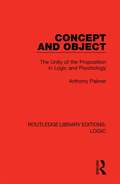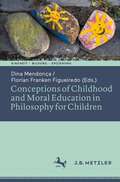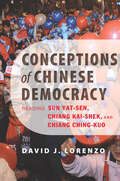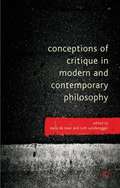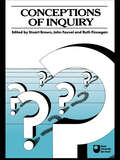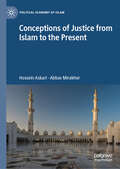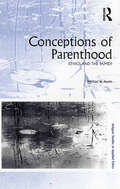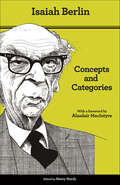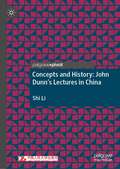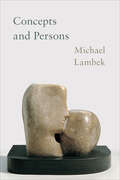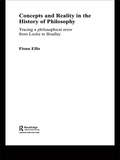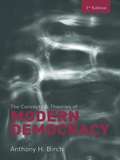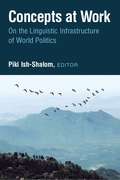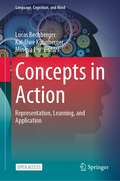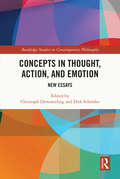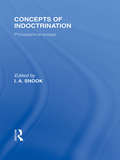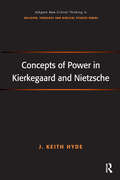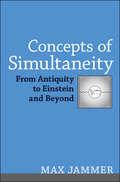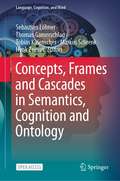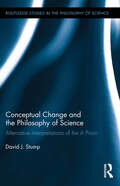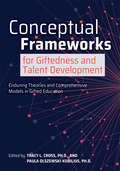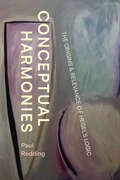- Table View
- List View
Concept and Object: The Unity of the Proposition in Logic and Psychology (Routledge Library Editions: Logic)
by Anthony PalmerOriginally published in 1988. This text gives a lucid account of the most distinctive and influential responses by twentieth century philosophers to the problem of the unity of the proposition. The problem first became central to twentieth-century philosophy as a result of the depsychoiogising of logic brought about by Bradley and Frege who, responding to the ’Psychologism’ of Mill and Hume, drew a sharp distinction between the province of psychology and the province of logic. This author argues that while Russell, Ryle and Davidson, each in different ways, attempted a theoretical solution, Frege and Wittgenstein (both in the Tractatus and the Investigations) rightly maintained that no theoretical solution is possible. It is this which explains the importance Wittgenstein attached in his later work to the idea of agreement in judgments. The two final chapters illustrate the way in which a response to the problem affects the way in which we think about the nature of the mind. They contain a discussion of Strawson’s concept of a person and provide a striking critique of the philosophical claims made by devotees of artificial intelligence, in particular those made by Daniel Dennett.
Conceptions of Childhood and Moral Education in Philosophy for Children (Kindheit – Bildung – Erziehung. Philosophische Perspektiven)
by Dina Mendonça Florian Franken FigueiredoPhilosophy for Children (P4C) has long been considered as crucial for children’s ethical and moral education and a decisive contribution for education for the democratic life. The book gathers contributions from experts in the field who reflect on fundamental issues on how childhood and ethics are interrelated within the P4C movement. The main interest of this volume is to offer an understanding of how different philosophical conceptions of childhood can be coordinated with different ethical and meta-ethical philosophical considerations in P4C addressing topics such as P4C and relativism, P4C and Virtue ethics, ethics and emotions in P4C, philosophical commitments and P4C application, and Socratic practice within a pragmatist framework. A thought-provoking collection about how assumptions of particular philosophical conceptions of childhood modify moral and ethical education and a testimony of the undeniable contribution of P4C for moral education and reconceptualization of childhood.
Conceptions of Chinese Democracy: Reading Sun Yat-Zen, Chiang Kai-Shek, and Chiang Ching-Kuo
by David J. LorenzoAn accessible and critical introduction to the political writings of three seminal figures in modern Chinese democratic thought.Author and political scholar David J. Lorenzo examines the democratic writings of Sun Yat-sen, Chiang Kai-shek, and Chiang Ching-kuo, providing a coherent summary that situates their ideas within the broader traditions of political theory. His comparative study allows the reader to understand each leader’s perspective while highlighting important contradictions, strengths, and weaknesses. Lorenzo further considers the influence of their writings on political theorists, democracy advocates, and activists on mainland China.Students of political science and theory, democratization, and Chinese culture and history will benefit from the book’s substantive discussions of democracy. Scholars and specialists will appreciate the larger arguments about the influence of these ideas and their transmission through time.
Conceptions of Critique in Modern and Contemporary Philosophy
by Karin De Boer Ruth SondereggerDoes philosophical critique have a future? What are its possibilities, limits and presuppositions? This collection by outstanding scholars from various traditions, responds to these questions by examining the forms of philosophical critique that have shaped continental thought from Spinoza and Kant to Marx, Foucault, Derrida and Ranci#65533;re.
Conceptions of Inquiry
by Stuart BrownFirst Published in 1981. Routledge is an imprint of Taylor & Francis, an informa company.
Conceptions of Justice from Islam to the Present (Political Economy of Islam)
by Abbas Mirakhor Hossein AskariThis book explains a perspective on the system of justice that emerges in Islam if rules are followed and how the Islamic system is differentiated from the conventional thinking on justice. It examines conceptions of justice from the Enlightenment to Bentham to Rawls to contemporary philosophers including Sen, Cohen, Nussbaum, and Pogge. The authors present the views of twentieth century Muslim thinkers on justice who see Muslims upholding rituals but not living according to Qur’anic rules. It provides empirical surveys of the current state of justice in Muslim countries analyzing the economic, social, and political state of affairs. The authors conclude by assessing the state of justice-injustice in Muslim countries and highlighting areas in need of attention for justice to prevail.
Conceptions of Parenthood: Ethics and The Family (Ashgate Studies In Applied Ethics Ser.)
by Michael W. AustinOur parents often have a significant impact on the content of our beliefs, the values we hold, and the goals we pursue and becoming a parent can also have a similar impact on our lives. In Conceptions of Parenthood Michael Austin provides a rigorous and accessible philosophical analysis of the numerous and distinct conceptions of parenthood. Issues considered are the nature and justification of parental rights, the sources of parental obligations, the value of autonomy, and the moral obligations and tensions present within interpersonal relationships. Austin rejects the 'proprietarian', 'best interests of the child', and 'biological' conceptions of parenthood as failing to generate parental rights and obligations but considers more sympathetically the 'custodial relationship', 'consent', and 'causal' conceptions of parenthood and ultimately defends a 'stewardship' conception. Finally Austin explores the 'stewardship' view for practical and moral questions related to family life and social policy regarding the family, such as the education of children, the religious upbringing of children and state licensing of parents.
Conceptions of Set and the Foundations of Mathematics
by Luca IncurvatiSets are central to mathematics and its foundations, but what are they? In this book Luca Incurvati provides a detailed examination of all the major conceptions of set and discusses their virtues and shortcomings, as well as introducing the fundamentals of the alternative set theories with which these conceptions are associated. He shows that the conceptual landscape includes not only the naïve and iterative conceptions but also the limitation of size conception, the definite conception, the stratified conception and the graph conception. In addition, he presents a novel, minimalist account of the iterative conception which does not require the existence of a relation of metaphysical dependence between a set and its members. His book will be of interest to researchers and advanced students in logic and the philosophy of mathematics.
Concepts and Categories: Philosophical Essays - Second Edition
by Isaiah Berlin"The goal of philosophy is always the same, to assist men to understand themselves and thus to operate in the open, not wildly in the dark."--Isaiah Berlin This volume of Isaiah Berlin's essays presents the sweep of his contributions to philosophy from his early participation in the debates surrounding logical positivism to his later work, which more evidently reflects his life-long interest in political theory, the history of ideas, and the philosophy of history. Here Berlin describes his view of the nature of philosophy, and of its main task: to uncover the various models and presuppositions--the concepts and categories--that men bring to their existence and that help form that existence. Throughout, his writing is informed by his intense consciousness of the plurality of values, the nature of historical understanding, and of the fragility of human freedom in the face of rigid dogma. This new edition adds a number of previously uncollected pieces that throw further light on Berlin's central philosophical concerns, and a revealing exchange of letters with the editor and Bernard Williams about the genesis of the book.
Concepts and History: John Dunn’s Lectures in China
by Shi LiThis book brings together three recent talks given by John Dunn in China: two full lectures, and one shorter talk followed by the transcription of an extended Q&A session with some eminent Chinese political philosophers and historians of political thought. These three chapters are followed by an intellectual-biographical interview with Dunn. Each of the chapters bears some relevance to Chinese political thought or at least pursues a general ‘East meets West’ theme. The chapters can be read in any order, although they present some common themes.
Concepts and Persons
by Michael LambekThe Tanner Lectures are a collection of educational and scientific discussions relating to human values. Conducted by leaders in their fields, the lectures are presented at renowned institutions around the world, including the universities of Oxford, Harvard, and Yale. In January 2019, University of Toronto’s Michael Lambek, professor, former Canada Research Chair, and member of the Royal Society of Canada, delivered the Tanner Lecture at the University of Michigan’s Department of Philosophy on the topic of "Concepts and Persons." As well as tracing his career in social and cultural anthropology, Lambek’s Tanner Lecture spoke on the intersection of anthropology and philosophy as a means of articulating the moral basis of human action. Lambek’s lecture is a profound examination of the human condition, and is beautifully captured in this publication. Concepts and Persons recounts the lecture as delivered during the prestigious event, the commentary of three distinguished respondents, and Lambek’s own response to that commentary. The book’s presentation of the lecture also includes a rich and layered set of notes that augment the lecture significantly and offer additional clarification and thought developed since the event.
Concepts and Reality in the History of Philosophy: Tracing a Philosophical Error from Locke to Bradley (Routledge Advances in the History of Philosophy #Vol. 1)
by Fiona EllisThis book traces a deep misunderstanding about the relation of concepts and reality in the history of philosophy. It exposes the influence of the mistake in the thought of Locke, Berkeley, Kant, Nietzche and Bradley, and suggests that the solution can be found in Hegelian thought. Ellis argues that the treatment proposed exemplifies Hegel's dialectical method. This is an important contribution to this area of philosophy.
Concepts and Theories of Modern Democracy
by Anthony H. BirchThis highly acclaimed and popular academic text is now available in a new edition, having been revised and updated to cover the analyses of the use, abuse and ambiguity of many essential concepts used in political discourse and political studies. These include basic concepts such as liberty, democracy, rights, representation, authority and political power. New to this edition are three sections of great topical interest: entirely original analysis of global terrorism, which puts the recent developments of Islamic terrorism into perspective by comparing it with earlier examples of terrorist tactics by a variety of state agencies, revolutionary groups and minority nationalist movements extended discussion on multiculturalism, which supplements theoretical arguments with succinct summaries of the differing ways in which ethnic and cultural minorities have been dealt with in Canada, Britain, France and the Netherlands section on democratization that focuses on the problems, social and political and even theological, involved in turning authoritarian regimes into stable democracies in the Middle East and elsewhere. Concepts and Theories of Modern Democracy is a stimulating guide to current world problems as well as essential reading for foundation courses at first or second year level such as elements of politics, political concepts and ideas and fundamentals in politics.
Concepts at Work: On the Linguistic Infrastructure of World Politics
by Piki Ish-ShalomConcepts are socially and linguistically constructed and used for multiple purposes, such as justifying war in the name of democracy; or, using the idea of democracy to resist Western intervention and influence. In this fascinating and novel edited collection, Piki Ish-Shalom and his team of authors interrogate the “conceptions of concepts” in international relations. Using theoretical frameworks from Gramsci and Bourdieu, among others, the authors show that not interrogating the meaning of the language we use to talk about international relations obscures the way we understand (or portray) IR. The authors examine self-determination, winning in war, avoidance of war, military design and reform agenda, vagueness in political discourse, “blue economy,” friendship, and finally, the very idea of the “international community” itself. As the author asserts, Bourdieu’s sociology of field and Gramsci’s political theory combined “offer us a sociopolitical theory of relations of power and domination concealed by doxic knowledge and taken-for-granted rules, in which essential contested concepts and political-serving conceptions can and do play an important role.”
Concepts in Action: Representation, Learning, and Application (Language, Cognition, and Mind #9)
by Lucas Bechberger Kai-Uwe Kühnberger Mingya LiuThis open access book is a timely contribution in presenting recent issues, approaches, and results that are not only central to the highly interdisciplinary field of concept research but also particularly important to newly emergent paradigms and challenges. The contributors present a unique, holistic picture for the understanding and use of concepts from a wide range of fields including cognitive science, linguistics, philosophy, psychology, artificial intelligence, and computer science. The chapters focus on three distinct points of view that lie at the core of concept research: representation, learning, and application. The contributions present a combination of theoretical, experimental, computational, and applied methods that appeal to students and researchers working in these fields.
Concepts in Thought, Action, and Emotion: New Essays (Routledge Studies in Contemporary Philosophy)
by Christoph Demmerling Dirk SchröderIn recent years, the idea of a concept has become increasingly central to different areas of philosophy. This collection of original essays presents philosophical perspectives on the link between concepts and language, concepts and experience, concepts and know-how, and concepts and emotion. The essays span a variety of interrelated philosophical domains ranging from epistemology, philosophy of language, philosophy of mind, philosophy of action, and the philosophy of emotions. Among the central questions addressed by the contributors are: What are concepts? What is nonconceptual content? Does perceptual experience have conceptual content? Is conceptual thought language dependent? How do we form new concepts? Does practical knowledge have propositional content? Is practical understanding conceptual (without being propositional)? Do emotions have a representational content and if so, is the representational content conceptual? Concepts in Thought, Action, and Emotion advances current debates about concepts and will interest scholars across a broad range of philosophical disciplines.
Concepts of Indoctrination (International Library of the Philosophy of Education Volume 20): Philosophical Essays
by I. A. SnookIndoctrination is an important concept in educational philosophy. It bears on many areas of study, including ethics, epistemology and philosophy of science, and opens up new paths of investigation into such questions as classroom method and the rights of parents and their children. This book brings together a number of key articles which discuss indoctrination in relation to aspects of religion and morals, dotrines and moral responsibility. This volume combines both American and English interpretations of a crucial idea in the philosophy of education and helps bridge the gap between the teaching of the subject in the USA and the UK.
Concepts of Power in Kierkegaard and Nietzsche (Routledge New Critical Thinking in Religion, Theology and Biblical Studies)
by J. Keith HydeThe name Friedrich Nietzsche has become synonymous with studies in political power. The application of his theory that the vast array of human activities comprises manifestations of the will to power continues to influence fields as diverse as international relations, political studies, literary theory, the social sciences, and theology. To date, the introduction of Søren Kierkegaard into this discussion has been gradual at best. Long derided as the quintessential individualist, the social dimension of his fertile thought has been neglected until recent decades. This book situates Kierkegaard in direct dialogue with Nietzsche on the topic of power and authority. Significant contextual similarities warrant such a comparison: both severely criticized state Lutheranism, championed the self and its imaginative ways of knowing against the philosophical blitzkrieg of Hegelianism, and endured the turbulent emergence of the nation-state. However, the primary justification remains the depth-defying prescience with which Kierkegaard not only fully anticipates but rigorously critiques Nietzsche's power position thirty years in advance.
Concepts of Simultaneity: From Antiquity to Einstein and Beyond
by Max JammerMax Jammer's Concepts of Simultaneity presents a comprehensive, accessible account of the historical development of an important and controversial concept—which played a critical role in initiating modern theoretical physics—from the days of Egyptian hieroglyphs through to Einstein's work in 1905, and beyond. Beginning with the use of the concept of simultaneity in ancient Egypt and in the Bible, the study discusses its role in Greek and medieval philosophy as well as its significance in Newtonian physics and in the ideas of Leibniz, Kant, and other classical philosophers. The central theme of Jammer's presentation is a critical analysis of the use of this concept by philosophers of science, like Poincaré, and its significant role in inaugurating modern theoretical physics in Einstein's special theory of relativity. Particular attention is paid to the philosophical problem of whether the notion of distant simultaneity presents a factual reality or only a hypothetical convention. The study concludes with an analysis of simultaneity's importance in general relativity and quantum mechanics.
Concepts, Frames and Cascades in Semantics, Cognition and Ontology (Language, Cognition, and Mind #7)
by Thomas Gamerschlag Henk Zeevat Markus Schrenk Sebastian Löbner Tobias KalenscherThis open access book presents novel theoretical, empirical and experimental work exploring the nature of mental representations that support natural language production and understanding, and other manifestations of cognition. One fundamental question raised in the text is whether requisite knowledge structures can be adequately modeled by means of a uniform representational format, and if so, what exactly is its nature.Frames are a key topic covered which have had a strong impact on the exploration of knowledge representations in artificial intelligence, psychology and linguistics; cascades are a novel development in frame theory. Other key subject areas explored are: concepts and categorization, the experimental investigation of mental representation, as well as cognitive analysis in semantics. This book is of interest to students, researchers, and professionals working on cognition in the fields of linguistics, philosophy, and psychology.
Conceptual Change and the Philosophy of Science: Alternative Interpretations of the A Priori (Routledge Studies in the Philosophy of Science)
by David J. StumpIn this book, David Stump traces alternative conceptions of the a priori in the philosophy of science and defends a unique position in the current debates over conceptual change and the constitutive elements in science. Stump emphasizes the unique epistemological status of the constitutive elements of scientific theories, constitutive elements being the necessary preconditions that must be assumed in order to conduct a particular scientific inquiry. These constitutive elements, such as logic, mathematics, and even some fundamental laws of nature, were once taken to be a priori knowledge but can change, thus leading to a dynamic or relative a priori. Stump critically examines developments in thinking about constitutive elements in science as a priori knowledge, from Kant’s fixed and absolute a priori to Quine’s holistic empiricism. By examining the relationship between conceptual change and the epistemological status of constitutive elements in science, Stump puts forward an argument that scientific revolutions can be explained and relativism can be avoided without resorting to universals or absolutes.
Conceptual Frameworks for Giftedness and Talent Development: Enduring Theories and Comprehensive Models in Gifted Education
by Paula Olszewski-Kubilius Tracy CrossConceptual Frameworks for Giftedness and Talent Development explores current and enduring theories and comprehensive models of giftedness and talent development. Each chapter:Includes a description of a different model, theory, or framework.Shares the most important implications of each model, including underrepresentation and social justice issues.Provides commentary on how each model compares to others.Includes discussion questions for use with students and professionals.The editors also consider common issues across conceptual frameworks, such as the degree to which achievement defines giftedness, the goal of gifted education, and the role of psychosocial factors. This is a comprehensive reference for scholars and practitioners in the field, as well as those studying at the graduate level.
Conceptual Harmonies: The Origins and Relevance of Hegel’s Logic
by Paul ReddingA new reading of Hegel’s Science of Logic through the history of European mathematics. Conceptual Harmonies develops an original account of G. W. F. Hegel’s perplexing Science of Logic from a simple insight: philosophical and mathematical thought have shaped each other since classical times. Situating Science of Logic within the rise of modern mathematics, Redding stresses Hegel’s attention to Pythagorean ratios, Platonic reason, and Aristotle’s geometrically inspired logic. He then explores how later traditions shaped Hegel’s world, through both Leibniz and new forms of algebraic geometry. This enlightening reading recovers an overlooked stream in Hegel’s philosophy that remains, Redding argues, important for contemporary conceptions of logic.
Conceptual Harmonies: The Origins and Relevance of Hegel’s Logic
by Paul ReddingA new reading of Hegel’s Science of Logic through the history of European mathematics.Conceptual Harmonies develops an original account of G. W. F. Hegel’s perplexing Science of Logic from a simple insight: philosophical and mathematical thought have shaped each other since classical times. Situating Science of Logic within the rise of modern mathematics, Redding stresses Hegel’s attention to Pythagorean ratios, Platonic reason, and Aristotle’s geometrically inspired logic. He then explores how later traditions shaped Hegel’s world, through both Leibniz and new forms of algebraic geometry. This enlightening reading recovers an overlooked stream in Hegel’s philosophy that remains, Redding argues, important for contemporary conceptions of logic.
Conceptual Integrated Science--explorations
by Paul HewittFrom the author of the number one textbooks in physical science and physics comes the eagerly awaiting new text, Conceptual Integrated Science. Hewitt's critically acclaimed conceptual approach has led science education for 30 years and now tackles integrated science to take student learning to a new level. Using his proven conceptual approach, accessible writing, and fun and informative illustrations, Hewitt and his team of science experts have crafted a text that focuses on the unifying concepts and real-life examples across physics, chemistry, earth science, biology, and astronomy.The book includes best-selling author Paul Hewitt's proven pedagogical approach, straight-forward learning features, approachable style, and rigorous coverage. The result is a wide-ranging science text that is uniquely effective and motivational. Conceptual Integrated Science is accompanied by an unparalleled media package that combines interactive tutorials, interactive figures, and renowned demonstration videos to help students outside of class and instructors in class.
